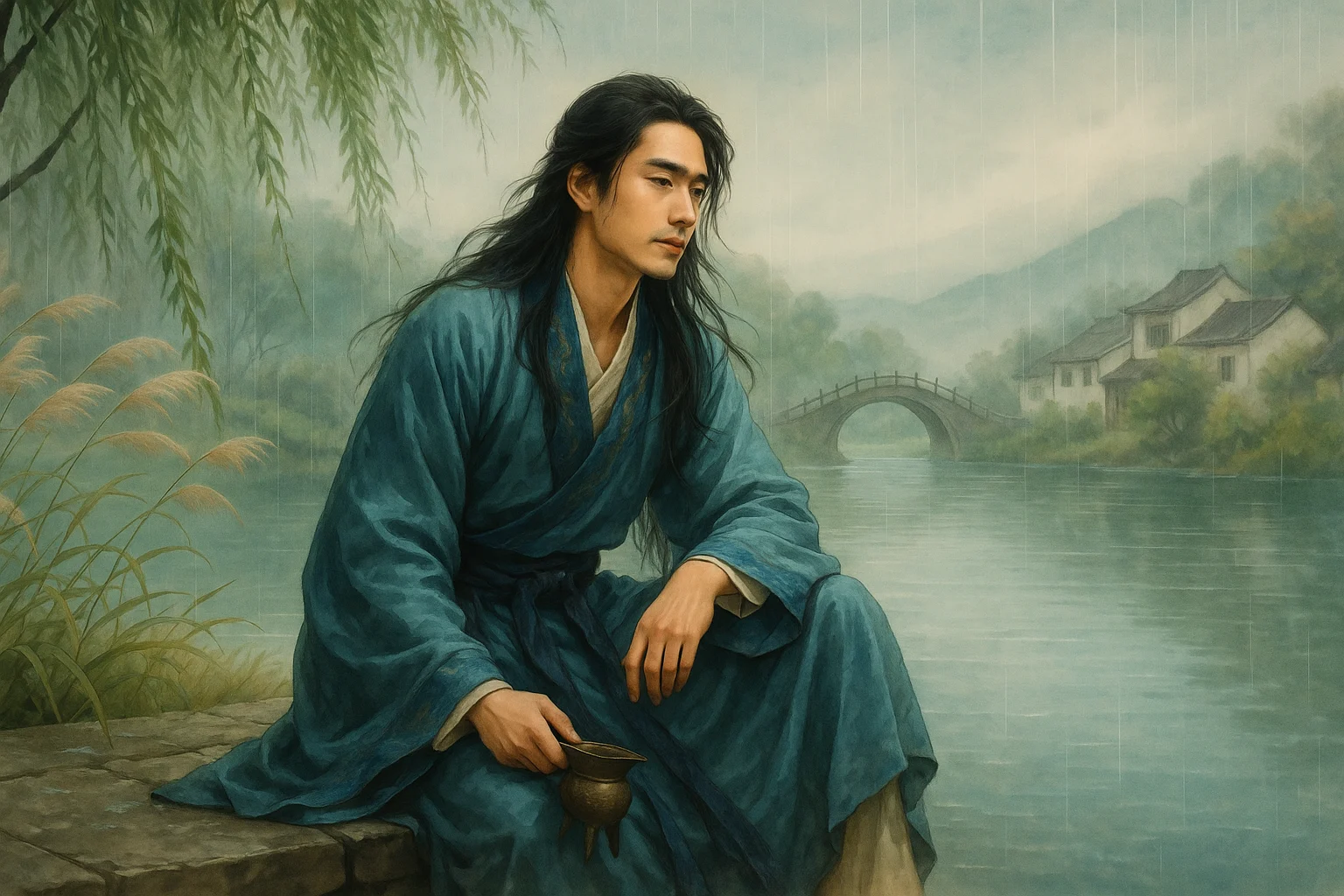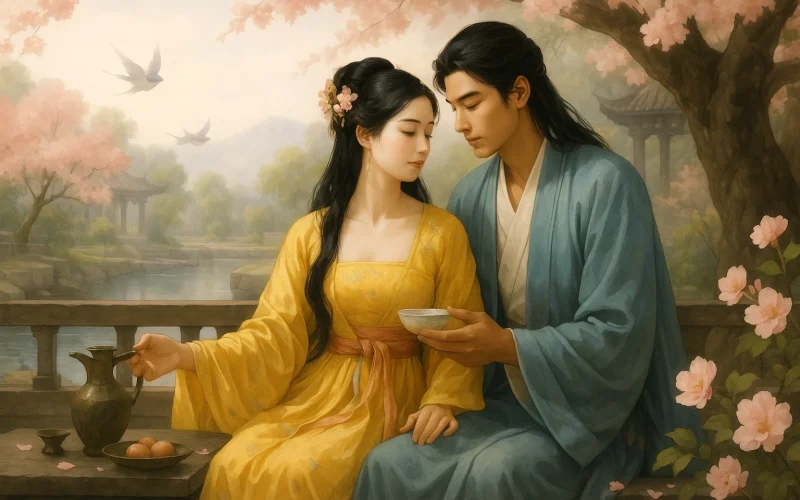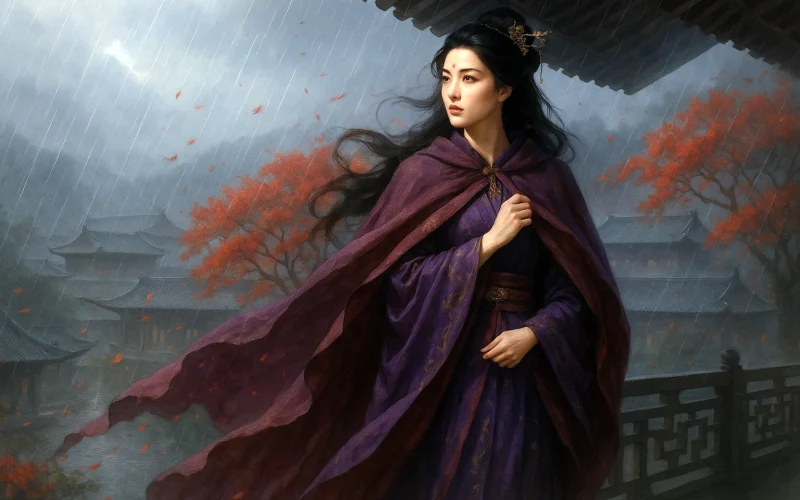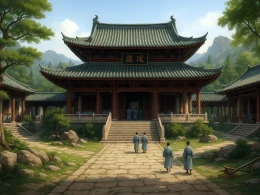O springtime revel!
One cup of jade-green wine,
One song—then thrice I bow divine:
“First, grant my love a thousand years’ delight;
Next, keep my health as yours, so bright;
Last, let us cling like swallows paired,
Each spring renewed, each love declared!”
Original Poem
「长命女 · 春日宴」
冯延巳
春日宴,绿酒一杯歌一遍。
再拜陈三愿:一愿郎君千岁,二愿妾身常健,三愿如同梁上燕,岁岁长相见。
Interpretation
Feng Yansi was a prominent ci poet of the Southern Tang during the Five Dynasties period, known for his graceful and delicate style. His works often focused on themes of boudoir sentiments, love, and nostalgic thoughts, representing the transitional development of the refined ci style from the Five Dynasties to the Song Dynasty. This particular short ci is one of his more representative works. Though categorized as a celebratory drinking song, it contains genuine and delicate emotions with a natural and lively tone. The poem depicts a spring banquet scene and presents "three wishes" from a woman's perspective, each expressing ideals of love and companionship, revealing ancient women's pure, beautiful, and gentle yet unassuming aspirations for love.
First Stanza: "春日宴,绿酒一杯歌一遍。"
Chūn rì yàn, lǜ jiǔ yī bēi gē yī biàn.
A spring day's feast,
with a cup of green wine and a song sung once.
The poet sets the season with "spring day," while "feast," "wine," and "song" depict the joyous atmosphere of the banquet. The term "green wine" carries classical charm, often referring to freshly brewed spring wine with its emerald hue and sweet taste, embodying the vitality and soft beauty of spring. "A song sung once" creates a relaxed and elegant rhythm, portraying the woman's contented expression as she drinks and sings. This line establishes a cheerful and bright emotional backdrop for the entire poem.
Second Stanza: "再拜陈三愿:一愿郎君千岁,二愿妾身常健,三愿如同梁上燕,岁岁长相见。"
Zài bài chén sān yuàn: Yī yuàn láng jūn qiān suì, èr yuàn qiè shēn cháng jiàn, sān yuàn rú tóng liáng shàng yàn, suì suì cháng xiāng jiàn.
With another bow, I present three wishes:
First, may my lord live a thousand years;
Second, may I always remain healthy;
Third, may we be like swallows on the beam,
Meeting year after year without end.
The phrase "with another bow" conveys the solemnity of the woman's tone and the sincerity of her feelings. The "three wishes" progress from praying for her beloved's longevity, her own health, to their enduring companionship, each layer deepening the emotional resonance. The final line, "like swallows on the beam," draws on the natural behavior of swallows—pairing and returning yearly to their nests—as a metaphor for the couple's lasting togetherness. The closing words, "meeting year after year," express the most simple yet heartfelt longing for perpetual union.
Holistic Appreciation
Though concise in form, this short lyric poem brims with emotional depth and exquisite craftsmanship. Through the motif of a woman making wishes over wine, it artfully weaves heartfelt blessings for love into the vibrant setting of a springtime banquet. The poem reads with effortless grace, devoid of any artificiality. Particularly noteworthy is the "three wishes" section, which follows the traditional structure of benedictions while avoiding clichés—its simple language conveying genuine emotion, expressing a pure yet profound yearning for love. The diction, though unadorned, resonates with lyrical charm, and the refreshingly bright style carries distinct folk-song qualities.
Artistic Merits
This poem excels in the compact form of the short lyric, employing a first-person perspective that heightens its authenticity and intimacy. Structurally, it begins by setting the scene—describing the banquet and season—before unfolding through the "three wishes," creating a tight yet natural progression that builds emotion with perfect cadence. Linguistically, it strikes a delicate balance between classical elegance and colloquial warmth, blending literary refinement with everyday charm. This showcases Feng Yansi's mastery of embedding nuanced emotions within minimalist forms.
Insights
Beyond depicting the joyous scene of a spring banquet, this poem offers readers the most sincere expressions of love's aspirations. It reminds us that the true value of emotion lies not in extravagant vows but in simple, enduring companionship. The line "May we meet year after year" captures the most ordinary yet profoundly moving sentiment, urging modern readers to cherish those before us and to invest true feeling in life's quiet, steady rhythms—for therein lies genuine happiness.
About the Poet

Feng Yansi (冯延巳 903 - 960), courtesy name Zhengzhong, was a native of Guangling (modern-day Yangzhou, Jiangsu) and a renowned ci poet of the Southern Tang during the Five Dynasties and Ten Kingdoms period. Rising to the position of Left Vice Director of the Department of State Affairs (Zuo Puye Tongping Zhangshi), he enjoyed the deep trust of Emperor Li Jing. His ci poetry forged a new path beyond the Huajian tradition, directly influencing later masters like Yan Shu and Ouyang Xiu, playing a pivotal role in the transition of ci from "entertainment for musicians" to "literary expression of scholar-officials."












